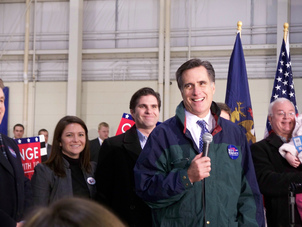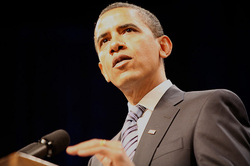
How distracted? Rube often would run out of the dugout during games to chase fire trucks down the street. Opposing players and fans soon caught on and brought shiny toys or puppies to games to hold up as he pitched, often getting him to stare at them rather than at the game.

Presidential politics has become a contest of shiny objects and puppies. Only, we don’t call them shiny objects, we call them“memes.”
In a tight race especially, the hope is that by distracting voters, by turning a talking point into an ironic joke, a candidate can gain points without actually having to debate a serious, nuanced issue, or without having to articulate a response.
(Story continues below)
A nation full of Internet rubes is happy to oblige the candidates on both sides, turning it into a parlor game of sorts on social media.
It didn’t take long during Tuesday night’s second presidential debate for these folks to find such a shiny object. Mitt Romney was making a point about pay equity and said when he was governor of Massachusetts, he asked his staff to find more qualified women applicants for cabinet positions.
“I went to a number of women’s groups and said, ‘Can you help us find folks?’” Romney said. “And they brought us whole binders full of women.”
Suddenly, “Binders full of women” became the latest catchphrase for opponents of the GOP candidate, inspiring visual images that ranged from the old-fashioned “black book” kept by playboys to things far more lurid.
The dictionary defines a meme as a cultural item that is transmitted similar to the transmission of genes. In a modern sense, however, it’s just a phrase or mannerism that goes viral and becomes a type of defining moment.
By the end of the evening, Twitter accounts were set up and the hashtag #bindersfullofwomen was going strong.
And not the slightest step had been taken toward a substantive discussion of pay equity.
This meme-stream is not a product of the left alone. Republicans earlier this year pounced on President Obama for using the phrase “You didn’t build that.” It has come to symbolize the president as a purveyor of socialism, ignoring his larger point that every successful person can thank teachers, others who came before him and government-funded infrastructure for making success a little easier.
Take out the infrastructure part and you have a nice Sunday sermon that might get a congregation full of right-wingers to smile and nod.
Like rumors or nicknames, memes often contain a grain of truth. Joe Biden’s laugh during the vice presidential debate and his use of the term “Malarky!” became memes reflecting parts of his personality.
But they distract us from looking any further.
This isn’t the first election to be meme-ified. Just ask Sarah Palin, who could “See Russia from her backyard,” (even though she never said it quite that way), or Al Gore’s invention of the Internet.
Nor are memes a recent invention. In 1964, the Lyndon Johnson campaign exaggerated Barry Goldwater’s position on national defense. The “Daisy” ad, a TV commercial featuring a little girl, a daisy and a detonated atomic bomb, portrayed Goldwater as dangerous. His slogan, “In your heart you know he’s right” was caricatured as, “In your guts you know he’s nuts.”
We laugh, we spread the joke and we move on, shoving the serious issues into a back drawer. We worship at the altar of irony without noticing that many of our jokes mock things we profess to hold dear. The “binders” meme, for example, inspired comments that could charitably be described as sexist or objectifying toward women.
This annoying habit says more about Americans than it does the candidates themselves. Despite the distractions, Rube Waddell still managed a successful big-league pitching career. Had be lived today and followed politics, he might have gone mad.

 RSS Feed
RSS Feed

